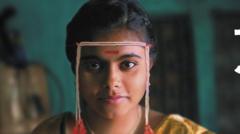"Sthal" provides a candid portrayal of societal norms that objectify women in a patriarchal society.
**The Indian Film Exposing the Harsh Realities of Arranged Marriage**

**The Indian Film Exposing the Harsh Realities of Arranged Marriage**
A new Marathi film sheds light on the emotional trauma faced by women in the arranged marriage system.
In India, arranged marriages are often seen as a cultural tradition, but for many women, this norm can become a painful experience. The film "Sthal: A Match," recently released in Indian theaters, dives deep into this reality from the perspective of Savita, a young woman in rural Maharashtra who aspires for education and independence but finds herself caught in the restrictive expectations of her family and society.
Directed by Jayant Digambar Somalkar, "Sthal" presents an unfiltered narrative about Savita’s journey as her father, Daulatrao Wandhare, seeks a suitable husband for her. The film has garnered critical acclaim at various film festivals, standing out for its raw depiction of the humiliation faced by women during the matchmaking process—a theme that resonates deeply as Savita, portrayed by Nandini Chikte, navigates repeated judgments from potential suitors and their families.
The storyline opens with Savita in a scenario filled with anxiety—interviewing a prospective groom while surrounded by her female companions. This sequence sets the tone for the film, which starkly contrasts the fantasies surrounding wedding traditions with the grim realities faced by women like Savita, who often bear the brunt of societal expectations.
In a local culture steeped in patriarchal values, Savita's ambitions are overshadowed by the urgent need for marriage, a situation compounded by societal norms that prioritize attributes such as skin color and physical appearance over a woman's personal aspirations. Despite Savita’s protests for a career-oriented future, her wishes are dismissed, encapsulating the harsh truth that marriage remains the focal point of existence for women in many rural Indian communities.
Facing constant rejection, Savita’s character reflects the plight of countless young women who must navigate the deeply ingrained dowry system, an ongoing social evil despite its legal prohibition. The film sheds light on the financial and emotional stress families endure in meeting dowry demands, which can lead to tragic consequences—including domestic violence and, in extreme cases, bride-burnings.
Somalkar's inspiration for the film stems from his personal experiences observing the traditional matchmaking rituals in his own family. He aims to provoke discussion and challenge societal norms through "Sthal," encouraging audiences to reconsider the objectification of women ingrained in the marriage process.
While "Sthal" is one of many films addressing arranged marriages in India, it stands apart by focusing on the raw emotional experience rather than romanticizing wedding ceremonies. As India continues to grapple with the realities of arranged marriages, "Sthal" serves as a critical reminder of the need for change—one that has the potential to resonate with audiences and inspire a deeper conversation about women's rights and societal expectations.
Directed by Jayant Digambar Somalkar, "Sthal" presents an unfiltered narrative about Savita’s journey as her father, Daulatrao Wandhare, seeks a suitable husband for her. The film has garnered critical acclaim at various film festivals, standing out for its raw depiction of the humiliation faced by women during the matchmaking process—a theme that resonates deeply as Savita, portrayed by Nandini Chikte, navigates repeated judgments from potential suitors and their families.
The storyline opens with Savita in a scenario filled with anxiety—interviewing a prospective groom while surrounded by her female companions. This sequence sets the tone for the film, which starkly contrasts the fantasies surrounding wedding traditions with the grim realities faced by women like Savita, who often bear the brunt of societal expectations.
In a local culture steeped in patriarchal values, Savita's ambitions are overshadowed by the urgent need for marriage, a situation compounded by societal norms that prioritize attributes such as skin color and physical appearance over a woman's personal aspirations. Despite Savita’s protests for a career-oriented future, her wishes are dismissed, encapsulating the harsh truth that marriage remains the focal point of existence for women in many rural Indian communities.
Facing constant rejection, Savita’s character reflects the plight of countless young women who must navigate the deeply ingrained dowry system, an ongoing social evil despite its legal prohibition. The film sheds light on the financial and emotional stress families endure in meeting dowry demands, which can lead to tragic consequences—including domestic violence and, in extreme cases, bride-burnings.
Somalkar's inspiration for the film stems from his personal experiences observing the traditional matchmaking rituals in his own family. He aims to provoke discussion and challenge societal norms through "Sthal," encouraging audiences to reconsider the objectification of women ingrained in the marriage process.
While "Sthal" is one of many films addressing arranged marriages in India, it stands apart by focusing on the raw emotional experience rather than romanticizing wedding ceremonies. As India continues to grapple with the realities of arranged marriages, "Sthal" serves as a critical reminder of the need for change—one that has the potential to resonate with audiences and inspire a deeper conversation about women's rights and societal expectations.




















